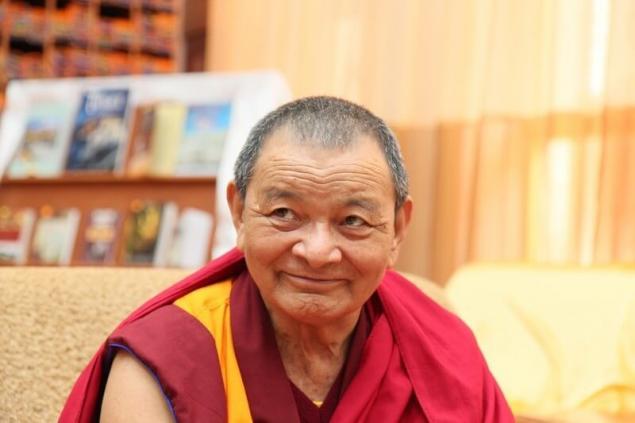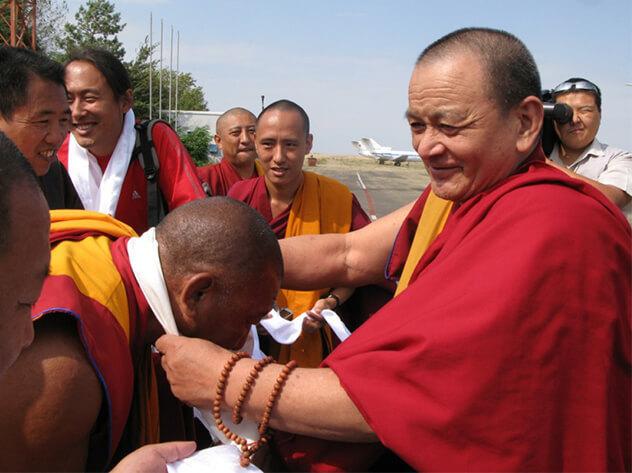865
The cure for ignorance
The idea to ask for explanations about the nature of faith and reason to the Tibetan lama, came unexpectedly. Our logic was simple: because Buddhism is the religion of Buddhists do not believe, moreover, Buddhism is quite rational doctrine, then, who else but them, have a clear idea about faith and reason and a clear understanding of their functions
Equally surprising was the realization of our ideas. Fate has given us a chance to talk with Geshe Yonten lharamboy Damcho, rector of the largest Tibetan monastery philosophical university Drepung Gomang.
Our conversation took place during his visit to Kalmykia in the library of the Central khurul Elista "Golden Abode of Buddha Shakyamuni". It was the last day of stay Honourable Geshe in Elista. He had just returned from a meeting with scientists of Kalmyk, and after our conversation, he still had to spend the last session with the laity and monks on the philosophy of the highest school of Buddhism - Prasangika-Madhyamika
.
At all the meetings he was accompanied by one of the best translators of Tibetan in our country Bem Mitruev without the dedicated work of our conversation which could hardly be possible.
Lyudmila Sergienko: Honourable Geshe, the Dalai Lama called Buddhism is not a religion but a science of the mind. Is there room for faith in Buddhism?
Geshe Yonten Damcho: Yes, faith in Buddhism has
. L. S .: And what? After all, in Buddhism, God, who is the creator of the universe, people and all things, is completely negated. And Shakyamuni Buddha is not a god, but a man, and therefore, like any human being, as opposed to the all-good and all-powerful God, has its drawbacks. What is the Buddhist faith and what it is based?
J. D .: Let's start with the fact that when the Buddha had not yet reached complete Enlightenment, he was just a man, and had flaws. But at that time he was not called a Buddha, and he was not the object of our Sanctuary. That is, we did not take refuge in it, we do not commit ourselves to the Buddha.
And when the Buddha was in the way of training, that is, in all his previous reincarnations, he was a simple man. Or maybe not a simple personality - but whatever it was, it still had shortcomings and was not a Buddha and, accordingly, is not our object of refuge
. But over time, the Buddha began to distinguish and understand, which is a disadvantage, that is an advantage. And so he began to address the shortcomings and absorb all the virtues, that is, he began to take all the necessary dignity. And eventually he achieved full enlightenment, became the Buddha, that is, get rid of all the shortcomings, all the advantages gained. it is becoming the Buddha, he was one of the Three Jewels, in which we take refuge, who entrust themselves.
That is, until he reached full Awakening, he was a man. Then, when he reached full awakening, he became the Buddha. And when he became the Buddha, he completely get rid of all the shortcomings and gained all the advantages. we take refuge, we believe in this Buddha This Buddha.
L. S .: And what place in Buddhism occupies the mind? And how it relates to faith?
J. E .: In Buddhism, there is what is called faith, and what is called the mind. Reason and faith go hand in hand.
Maybe you see some flaw in the fact that His Holiness called Buddhism a science of the mind, because it is considered that there is no place in the science of faith? But there is no shortage. The fact is that from the point of view of Buddhism, the mind must be supplemented by faith, faith must be supplemented by the mind, that is, these two aspects of the teaching should go together. In fact, faith is an aspect of the method in Buddhism. The mind is an aspect of wisdom. And wisdom, together with the method must go hand in hand.
If we follow the same faith, this is wrong, because it can lead us to the wrong path. Faith is very important of course. First, faith in man appears with respect to any object. For example, we all believe in the Buddha Shakyamuni, whose followers are. But it is very important that with the mind, with the help of rational thinking, logic, we could make sure that the object, which we believe, in fact, worthy of faith, really has the qualities that can make it worthy of belief.
Faith - this is what you need. From the Buddhist point of view, this is one of the forms of consciousness. In Buddhism, there is a division between the mind and mental factors. Now, faith is a mental factors. Faith is directed to its own object, that is, the object of faith. But faith as a mental factor can not distinguish good from bad, worthy from the unworthy. It simply aimed at the object. But the definition study whether this object is good or bad, worthy or unworthy - it is a function of the mind. This is determined by the logic, that is analytical thinking.
For example, you believe in science?
LS .: The science is probably not very good, because it can not answer all the questions.
J. E .: Do not you think that science - this is good
? LS .: Yes, that's good.
J. A .: In fact, and there is a belief. First, we think that something is good, then this belief appears.
In general, in Buddhism, there are three kinds of faith. And the first of these types appears when something we feel good and we start to believe it, as is the case with your perception of science. This confidence, self-sufficient faith, a faith that is oriented to its object.
There are also two other kinds of faith - a clear faith, faith realized. But they are now, we will not talk, because they explain the rather complicated. For example, a clear example of faith in Buddhism is the faith in the Three Jewels, in the esteem enjoyed by the Three Jewels.
Vadim Karelin: In today's world, at least in the West, great attention is paid to knowledge, rational perception. On the other hand, people are much less trust each other, love each other, believe in something. I believe that rational, logical knowledge instilled since childhood, and the faith and confidence have been neglected. And so hard for us to trust each other. How to learn the faith, trust?
J. D .: Very difficult question. In order to make you have a faith, or trust, you need an object, you might believe that you could be trusted. Tell me, is there some kind of a jewel, or someone, or something, what do you believe? Believe definitely, one hundred percent? There is?
VK .: No, there is no one hundred percent.
J. E .: Well, how then to take the faith, if you do not have any object or someone, something, what you believe one hundred percent? Where did she come, a faith?
It is just as if there is no fire, there is no smoke. To smoke was, it must be the root cause, you need a fire. And also if you do not object, which you believe, how will faith?
VK .: That is, you need to find the object?
J. E .: Yes, you need to find the object of faith.
Those who are followers of Christ, Christians believe in God. They believe in God, believe one hundred percent. Accordingly, they have faith appears. And then they have been using their intelligence, their thinking, in order to further develop this faith, in order to somehow explore their faith, and so on.
That is, for this you need to find an object, you can trust, who believe one hundred percent.
VK .: This object in Buddhism is called the Sanctuary? Or is it different things?
J. E .: Yes, that's what we have for three jewels, which we believe refuge.
You must use your intelligence and try to find something that suits you. To do this, you must consider some advantages and maybe disadvantages of one religion and another, a third, perhaps, Christianity, Islam, Buddhism. And in the end you are sure to find some kind of religious teaching that is right for you, in which you can believe it. Absolute Sanctuary source, in which you can trust and which will be able to say in the Buddhist, resort. And then you will be able to benefit others and thus benefit and to ourselves.
And it would be very nice if you looked at methods to eliminate those misfortunes, which we do not want. Unhappiness - is (I think you will agree with that) what we do not want. The suffering - this is what we do not want. Happiness - it's what we want to strive for, what we want. Thus, it is necessary to try to find doctrine, which explains the methods to eliminate misery and suffering, to gain happiness, that you seem to be true. And once you understand all this, you follow any one doctrine, which clearly, completely believe.
L. S .: For the Christian God is the master of his life. For this Buddhist ruler there. Does this mean that the Eastern man can do what he wants? Absolutely uncontrolled absolutely willfully?
J. E .: In principle, yes. In Buddhism, the complete freedom of will. That is, a person can make all the things that she wants. There is some higher will, which can cause a person to hold or.

At this point, the Master suddenly went on the offensive.
J. D .: Say, here you are, you whose followers?
LS .: Followers of Western philosophy classical sense.
J. A .: Could you tell us about the story this philosophy, the basic tenets of this philosophy?
Bohm explained: In Buddhism, there is such a thing as rank-ing - their own tradition. It postulates, or some certain things that we argue from the point of view of the school. And there is also such a thing kakschen-meadow - a foreign tradition. This is what we are trying to understand, sometimes even deny. And whose followers we actually enter into a dispute. So, in this case, the teacher asks you to tell about the basic postulates of the philosophical schools of thought, which you follow.
It was then that we got a good example of how to relate to Buddhism reason and faith. The teacher took the initiative in their hands and began to biased questioning us about our beliefs. Bem suffered and rolled his eyes, trying to shift the western views of the eastern mentality. The teacher continued to insist that we have explained to him, whether teaching, we follow the method to eliminate the disaster, to eliminate suffering at least on a personal level and to achieve happiness.
When I said, apparently imprudent word "soul," Boehm said, "Oh, my soul! Now begins! .. »
From further conversation, we got a very lively debate in the experience of a Tibetan monastery that has allowed us to realize the gaping holes in our outlook, which until then we were pretty high opinion. And in fact, here we have seen what is worth the most absolute lack of faith. These gaps we had to be patched directly to the discussion. Many of our applications called joyously spontaneous, almost childish laughter teacher. Bohm said: "If you're talking about something, then you should have a precise and clear idea of what you're saying, and you should be able to point to it with your finger, not literally, of course. And if you said the word "soul", then you should be able to say with certainty what is the soul, what it is and where is. Otherwise, your knowledge of the soul, in principle, is not knowledge, but is somewhere on the level of
beliefs. " But in the end, when we figured out in terms of the teacher even found matching our ideas in the philosophy of one of the Buddhist schools recognize the existence of the Self, he happily said ...
J. E .: Well, you can stick to and this theory. You can stick and the school of philosophical thought, which recognizes the existence of an all-inclusive, comprehensive Self. I belong to, in turn, to a school that does not recognize the existence of the Self. And that brings me good. You probably recognize the Atma, which covers all the phenomena, the entire universe, and, probably, it brings you a favor. This is just as the doctor prescribes the medicine. In your illness, apparently, helps your medicine - Atman that pervades all. Me, my illness helps, apparently, a medicine which denies the existence of the Self. Apparently, it benefits me.
our conversation time is coming to an end, the teacher in a hurry in the arc (prayer hall), where there were a lot of people to hear the doctrine of Pramana - reliable knowledge. Halfway to the door of the library teacher he stopped and returned to us. He was very happy and thanked us for being straightforward and the way we kept bravely without fear of his reactions and words. And we suddenly realized that even such a formal event, like an interview, Honourable Geshe used to in your compassion to help us personally make at least one step in the fight against our ignorance and become happier.
Author: Lyudmila Sergienko, Vadim Karelin
Equally surprising was the realization of our ideas. Fate has given us a chance to talk with Geshe Yonten lharamboy Damcho, rector of the largest Tibetan monastery philosophical university Drepung Gomang.
Our conversation took place during his visit to Kalmykia in the library of the Central khurul Elista "Golden Abode of Buddha Shakyamuni". It was the last day of stay Honourable Geshe in Elista. He had just returned from a meeting with scientists of Kalmyk, and after our conversation, he still had to spend the last session with the laity and monks on the philosophy of the highest school of Buddhism - Prasangika-Madhyamika
.

At all the meetings he was accompanied by one of the best translators of Tibetan in our country Bem Mitruev without the dedicated work of our conversation which could hardly be possible.
Lyudmila Sergienko: Honourable Geshe, the Dalai Lama called Buddhism is not a religion but a science of the mind. Is there room for faith in Buddhism?
Geshe Yonten Damcho: Yes, faith in Buddhism has
. L. S .: And what? After all, in Buddhism, God, who is the creator of the universe, people and all things, is completely negated. And Shakyamuni Buddha is not a god, but a man, and therefore, like any human being, as opposed to the all-good and all-powerful God, has its drawbacks. What is the Buddhist faith and what it is based?
J. D .: Let's start with the fact that when the Buddha had not yet reached complete Enlightenment, he was just a man, and had flaws. But at that time he was not called a Buddha, and he was not the object of our Sanctuary. That is, we did not take refuge in it, we do not commit ourselves to the Buddha.
And when the Buddha was in the way of training, that is, in all his previous reincarnations, he was a simple man. Or maybe not a simple personality - but whatever it was, it still had shortcomings and was not a Buddha and, accordingly, is not our object of refuge
. But over time, the Buddha began to distinguish and understand, which is a disadvantage, that is an advantage. And so he began to address the shortcomings and absorb all the virtues, that is, he began to take all the necessary dignity. And eventually he achieved full enlightenment, became the Buddha, that is, get rid of all the shortcomings, all the advantages gained. it is becoming the Buddha, he was one of the Three Jewels, in which we take refuge, who entrust themselves.
That is, until he reached full Awakening, he was a man. Then, when he reached full awakening, he became the Buddha. And when he became the Buddha, he completely get rid of all the shortcomings and gained all the advantages. we take refuge, we believe in this Buddha This Buddha.
L. S .: And what place in Buddhism occupies the mind? And how it relates to faith?
J. E .: In Buddhism, there is what is called faith, and what is called the mind. Reason and faith go hand in hand.
Maybe you see some flaw in the fact that His Holiness called Buddhism a science of the mind, because it is considered that there is no place in the science of faith? But there is no shortage. The fact is that from the point of view of Buddhism, the mind must be supplemented by faith, faith must be supplemented by the mind, that is, these two aspects of the teaching should go together. In fact, faith is an aspect of the method in Buddhism. The mind is an aspect of wisdom. And wisdom, together with the method must go hand in hand.
If we follow the same faith, this is wrong, because it can lead us to the wrong path. Faith is very important of course. First, faith in man appears with respect to any object. For example, we all believe in the Buddha Shakyamuni, whose followers are. But it is very important that with the mind, with the help of rational thinking, logic, we could make sure that the object, which we believe, in fact, worthy of faith, really has the qualities that can make it worthy of belief.
Faith - this is what you need. From the Buddhist point of view, this is one of the forms of consciousness. In Buddhism, there is a division between the mind and mental factors. Now, faith is a mental factors. Faith is directed to its own object, that is, the object of faith. But faith as a mental factor can not distinguish good from bad, worthy from the unworthy. It simply aimed at the object. But the definition study whether this object is good or bad, worthy or unworthy - it is a function of the mind. This is determined by the logic, that is analytical thinking.
For example, you believe in science?
LS .: The science is probably not very good, because it can not answer all the questions.
J. E .: Do not you think that science - this is good
? LS .: Yes, that's good.
J. A .: In fact, and there is a belief. First, we think that something is good, then this belief appears.
In general, in Buddhism, there are three kinds of faith. And the first of these types appears when something we feel good and we start to believe it, as is the case with your perception of science. This confidence, self-sufficient faith, a faith that is oriented to its object.
There are also two other kinds of faith - a clear faith, faith realized. But they are now, we will not talk, because they explain the rather complicated. For example, a clear example of faith in Buddhism is the faith in the Three Jewels, in the esteem enjoyed by the Three Jewels.
Vadim Karelin: In today's world, at least in the West, great attention is paid to knowledge, rational perception. On the other hand, people are much less trust each other, love each other, believe in something. I believe that rational, logical knowledge instilled since childhood, and the faith and confidence have been neglected. And so hard for us to trust each other. How to learn the faith, trust?
J. D .: Very difficult question. In order to make you have a faith, or trust, you need an object, you might believe that you could be trusted. Tell me, is there some kind of a jewel, or someone, or something, what do you believe? Believe definitely, one hundred percent? There is?
VK .: No, there is no one hundred percent.
J. E .: Well, how then to take the faith, if you do not have any object or someone, something, what you believe one hundred percent? Where did she come, a faith?
It is just as if there is no fire, there is no smoke. To smoke was, it must be the root cause, you need a fire. And also if you do not object, which you believe, how will faith?
VK .: That is, you need to find the object?
J. E .: Yes, you need to find the object of faith.
Those who are followers of Christ, Christians believe in God. They believe in God, believe one hundred percent. Accordingly, they have faith appears. And then they have been using their intelligence, their thinking, in order to further develop this faith, in order to somehow explore their faith, and so on.
That is, for this you need to find an object, you can trust, who believe one hundred percent.
VK .: This object in Buddhism is called the Sanctuary? Or is it different things?
J. E .: Yes, that's what we have for three jewels, which we believe refuge.
You must use your intelligence and try to find something that suits you. To do this, you must consider some advantages and maybe disadvantages of one religion and another, a third, perhaps, Christianity, Islam, Buddhism. And in the end you are sure to find some kind of religious teaching that is right for you, in which you can believe it. Absolute Sanctuary source, in which you can trust and which will be able to say in the Buddhist, resort. And then you will be able to benefit others and thus benefit and to ourselves.
And it would be very nice if you looked at methods to eliminate those misfortunes, which we do not want. Unhappiness - is (I think you will agree with that) what we do not want. The suffering - this is what we do not want. Happiness - it's what we want to strive for, what we want. Thus, it is necessary to try to find doctrine, which explains the methods to eliminate misery and suffering, to gain happiness, that you seem to be true. And once you understand all this, you follow any one doctrine, which clearly, completely believe.
L. S .: For the Christian God is the master of his life. For this Buddhist ruler there. Does this mean that the Eastern man can do what he wants? Absolutely uncontrolled absolutely willfully?
J. E .: In principle, yes. In Buddhism, the complete freedom of will. That is, a person can make all the things that she wants. There is some higher will, which can cause a person to hold or.

At this point, the Master suddenly went on the offensive.
J. D .: Say, here you are, you whose followers?
LS .: Followers of Western philosophy classical sense.
J. A .: Could you tell us about the story this philosophy, the basic tenets of this philosophy?
Bohm explained: In Buddhism, there is such a thing as rank-ing - their own tradition. It postulates, or some certain things that we argue from the point of view of the school. And there is also such a thing kakschen-meadow - a foreign tradition. This is what we are trying to understand, sometimes even deny. And whose followers we actually enter into a dispute. So, in this case, the teacher asks you to tell about the basic postulates of the philosophical schools of thought, which you follow.
It was then that we got a good example of how to relate to Buddhism reason and faith. The teacher took the initiative in their hands and began to biased questioning us about our beliefs. Bem suffered and rolled his eyes, trying to shift the western views of the eastern mentality. The teacher continued to insist that we have explained to him, whether teaching, we follow the method to eliminate the disaster, to eliminate suffering at least on a personal level and to achieve happiness.
When I said, apparently imprudent word "soul," Boehm said, "Oh, my soul! Now begins! .. »
From further conversation, we got a very lively debate in the experience of a Tibetan monastery that has allowed us to realize the gaping holes in our outlook, which until then we were pretty high opinion. And in fact, here we have seen what is worth the most absolute lack of faith. These gaps we had to be patched directly to the discussion. Many of our applications called joyously spontaneous, almost childish laughter teacher. Bohm said: "If you're talking about something, then you should have a precise and clear idea of what you're saying, and you should be able to point to it with your finger, not literally, of course. And if you said the word "soul", then you should be able to say with certainty what is the soul, what it is and where is. Otherwise, your knowledge of the soul, in principle, is not knowledge, but is somewhere on the level of
beliefs. " But in the end, when we figured out in terms of the teacher even found matching our ideas in the philosophy of one of the Buddhist schools recognize the existence of the Self, he happily said ...
J. E .: Well, you can stick to and this theory. You can stick and the school of philosophical thought, which recognizes the existence of an all-inclusive, comprehensive Self. I belong to, in turn, to a school that does not recognize the existence of the Self. And that brings me good. You probably recognize the Atma, which covers all the phenomena, the entire universe, and, probably, it brings you a favor. This is just as the doctor prescribes the medicine. In your illness, apparently, helps your medicine - Atman that pervades all. Me, my illness helps, apparently, a medicine which denies the existence of the Self. Apparently, it benefits me.
our conversation time is coming to an end, the teacher in a hurry in the arc (prayer hall), where there were a lot of people to hear the doctrine of Pramana - reliable knowledge. Halfway to the door of the library teacher he stopped and returned to us. He was very happy and thanked us for being straightforward and the way we kept bravely without fear of his reactions and words. And we suddenly realized that even such a formal event, like an interview, Honourable Geshe used to in your compassion to help us personally make at least one step in the fight against our ignorance and become happier.
Author: Lyudmila Sergienko, Vadim Karelin
























